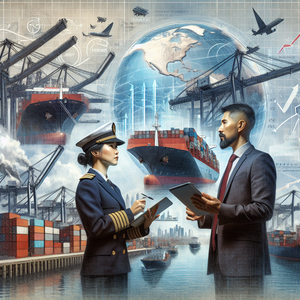
Exploring Careers in International Trade Law: 15 Essential Roles Shaping Global Trade Policy
International trade law is at the heart of the global economy, governing the rules, agreements, and regulatory frameworks that facilitate cross-border commerce. With globalization continuing to evolve and geopolitical tensions reshaping trade policies, the demand for experts who can navigate these complexities is higher than ever. Professionals in this field are key players in fostering economic growth, resolving disputes, and ensuring compliance with ever-changing legal standards.
Job Summaries:
International Trade Lawyer:
- International Trade Lawyers specialize in guiding businesses through the intricate legal frameworks that govern global trade.
- They handle export controls, sanctions compliance, and dispute resolution, often representing clients in matters before international trade organizations.
- Qualifications include a Juris Doctor (JD), bar licensure, and expertise in trade law, often bolstered by an LLM.
- These lawyers ensure compliance and help businesses expand internationally while mitigating risks.
Customs and Trade Compliance Specialist:
- These specialists manage import/export regulations, prepare customs documentation, and classify goods under the correct tariff schedules.
- A bachelor’s degree in business, international relations, or law is typically required, along with familiarity in global trade regulations.
- They prevent costly delays and penalties, helping businesses maintain smooth supply chains.
Trade Policy Advisor:
- Trade Policy Advisors analyze trade agreements, assess their impact, and negotiate terms on behalf of governments, NGOs, or corporations.
- They typically hold degrees in political science, economics, or law, with expertise in international relations.
- These advisors influence trade agreements that shape economic relationships between nations.
Export Control Officer:
- Export Control Officers focus on ensuring compliance with regulations related to sensitive goods, such as military technologies or dual-use items.
- They usually have a legal or technical degree and certifications like Certified Export Specialist (CES).
- Their role is critical in preventing illegal exports that could jeopardize national security or violate international agreements.
Trade Sanctions Specialist:
- Trade Sanctions Specialists develop and implement strategies to comply with economic sanctions while helping organizations navigate restrictions.
- They often have a background in law or international relations, complemented by strong analytical skills.
- These specialists ensure businesses avoid penalties while adhering to ethical trade practices.
International Business Consultant:
- These consultants advise companies on global market entry strategies, ensuring compliance with trade laws and mitigating risks.
- A degree in business or international relations, with expertise in market analysis and trade agreements, is typically required.
- They help businesses expand into new markets while navigating regulatory complexities.
Customs Broker:
- Customs Brokers facilitate the legal and efficient import/export of goods, ensuring compliance with customs regulations.
- Licensure and knowledge of trade documentation and tariff classifications are essential.
- They optimize supply chain efficiency and prevent bottlenecks at borders.
International Trade Compliance Officer:
- Compliance Officers oversee trade compliance programs, conduct audits, and investigate potential violations of international trade laws.
- A degree in business or law, with certifications in trade compliance like Certified Customs Specialist (CCS), is often required.
- They safeguard businesses from regulatory risks and maintain ethical standards.
Supply Chain Risk Manager:
- These professionals assess and address risks in global supply chains, including political, regulatory, and environmental factors.
- A background in logistics, business, or law, with strong analytical skills, is typically needed.
- They ensure businesses can adapt to disruptions and maintain operational continuity.
Trade Negotiator:
- Negotiators represent governments or corporations in discussions that shape trade agreements and policies.
- A degree in law, economics, or international relations, with strong diplomatic and negotiation skills, is required.
- They directly influence the terms of international trade, affecting economic relations worldwide.
Investment and Trade Policy Analyst:
- Analysts research the economic consequences of trade policies and provide insights to policymakers.
- A degree in economics or public policy, with advanced research skills, is essential.
- They influence decisions that drive investment and economic growth.
Anti-Dumping and Countervailing Duty Specialist:
- These specialists combat unfair trade practices by addressing issues like dumping and illegal subsidies.
- A law degree or experience in international trade is typically required.
- They protect domestic industries and promote fair competition.
International Arbitration Lawyer:
- Arbitrators resolve disputes between parties from different jurisdictions, providing an alternative to litigation.
- A JD or LLM with expertise in arbitration is required.
- They facilitate fair resolutions to conflicts, avoiding drawn-out legal battles.
Corporate Trade Counsel:
- Corporate Trade Counsels provide in-house legal advice on trade compliance, contracts, and dispute resolution.
- A law degree with a focus on international trade law is required.
- They help corporations manage legal risks as they expand globally.
Government Affairs Specialist:
- These specialists work to influence trade regulations and create favorable policies for their organizations.
- A degree in political science, law, or public policy is required.
- They shape the regulatory environment and ensure organizations thrive in a competitive global market.
Careers in international trade law offer diverse opportunities to make a meaningful impact on global commerce. Whether advising on compliance, negotiating trade agreements, or resolving disputes, professionals in this field play a critical role in fostering economic stability and growth. Aspiring professionals should focus on acquiring relevant degrees, certifications, and practical experience. Staying informed about geopolitical developments and industry trends is equally vital. With the global demand for trade law expertise on the rise, now is an excellent time to embark on this dynamic career path and contribute to shaping the future of international trade.
Explore More Jobs

